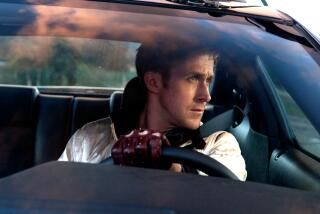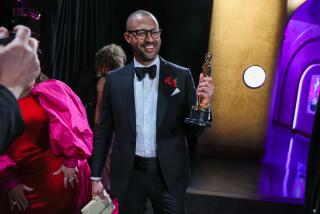REVIEW: ‘American Gangster’
IT takes nerve to call a film “American Gangster”: It’s more than a movie title, it’s the name of a venerable genre that dates to cinema’s beginnings. But once you see this finely made and richly satisfying film, you understand it’s the only title possible.
In part that’s because “American Gangster” is conscious of its place in that tough guy continuum. Visual and thematic references to classics such as “The Godfather,” “Once Upon a Time in America” and “The Asphalt Jungle” show that director Ridley Scott and screenwriter Steven Zaillian are quite aware of their film’s place in history.
More than that, with Oscar-winning costars Denzel Washington and Russell Crowe joining forces with Scott and Zaillian, two of the best at what they do, “American Gangster” is mindful of continuing another tradition, that of sweeping, old-school epic filmmaking that artfully heightens reality even if it’s based on the gritty facts of the Harlem drug trade of the 1970s.
Making this point even stronger is the presence of a pair of documentaries that cover roughly the same territory as “American Gangster.” Frank Lucas, the drug lord Denzel Washington plays, is profiled in a BET Networks hour, while Nicky Barnes, Lucas’ rival, gets a documentary of his own called “Mr. Untouchable.”
But it is a tribute to the complexity and drama of Zaillian’s character-driven script and to Scott’s commanding grasp of large-scale visuals and sweeping storytelling that the truth is puny and uninvolving compared with the bravura moviemaking webs these men can weave. Scott is the third director (after Antoine Fuqua and Terry George) who signed on for this project, and he brings to it cinematic gifts no one else has.
It is Zaillian and Scott’s notion that the gangster story is another version of the classic American success story, a theme that echoes “Asphalt Jungle’s” famous description of crime as “a left-handed form of human endeavor.” In the same way, the entrepreneurial Harlem drug dealers who wreak havoc in the streets took as gospel the line that starts “The Godfather:” “I believe in America.”
“American Gangster’s” two adversaries, drug kingpin Lucas (Washington) and Richie Roberts, the cop who becomes his “Les Misérables”-type nemesis (Crowe), can also be seen as two sides of the same scary coin, each of them fearless and driven by interior forces that make them terrors to be around.
Yet, unexpectedly, “American Gangster” has not only kept the face-to-face meetings between these two men to a minimum, it has also relegated them to the last hour of this 2-hour-and-40-minute film. In fact, Zaillian told Script magazine that he ended up “writing two separate scripts,” one from Lucas’ point of view, the other from Roberts’, and then combining them to compelling effect.
As the title indicates, this is Lucas’ story more than anyone else’s, and it is no disrespect to the charismatic, magnetic work Crowe does to say that Washington’s is the performance to savor here. The actor is always at his best, as he was in his Oscar-winning “Training Day,” as the magnetic bad guy, the man with a malleable code who can say things like “If you weren’t my brother I’d blow your brains out” and make you believe it.
Certainly the first glimpse we have of Lucas, being the good gangland soldier and unemotionally setting someone on fire, leaves us with few illusions about the man who was for 15 years the factotum to Harlem crime czar Bumpy Johnson. Yet Washington’s performance makes it possible for us to see nuances in the man’s character without shortchanging the malevolence of his actions, makes us see how in his own mind Lucas was a believer in family, integrity and character.
Washington is also expert at conveying the watchful waiting in Lucas, the man who took his time after Bumpy Johnson’s death in 1968 to understand the power structure in criminal Harlem and figure out how to work the area’s heroin traffic to his advantage. Bumpy, he notes, was rich, but “he wasn’t white-man wealthy,” and this becomes Lucas’ goal.
To achieve this, as related in the Mark Jacobson article in New York magazine that started the project, Lucas went to Thailand and made his own deals with growers for the purest dope, which he called Blue Magic and had shipped back to the U.S. in the coffins of Americans who died fighting in Vietnam. A left-handed form of human endeavor indeed.
Back in America, Lucas cuts deals with the Mafia and bumptious Harlem rival Nicky Barnes (Cuba Gooding Jr.), brings his brothers (including Chiwetel Ejiofor’s Huey) up from North Carolina to help him run the business and acquires a stunning Miss Puerto Rico (Lymari Nadal) as a girlfriend. “I sell product better than the competition at prices lower than the competition,” Lucas boasts. “I am my own company.”
Smoothly intercut by editor Pietro Scalia with these events is the story of Crowe’s Richie Roberts, a tough Jewish cop at home with both a swagger and a sledgehammer. Possessed of a volcanic temper and a disinclination to wait for warrants if there’s crime fighting to be done, the fearless, streetwise Roberts, like Lucas, has his own stern code of behavior.
So when he comes across a huge cache of money he could have walked off with, no questions asked, Roberts instead turns it in, and, like Frank Serpico before him, earns the enmity of those of his co-workers who are deeply suspicious of honest cops.
Being Richie also means royally irritating his wife, Laurie (Carla Gugino, far from “Spy Kids”), and getting into conflicts with connected crooked cops like Det. Trupo (the protean Josh Brolin). His worth is finally recognized, however, as part of a special antidrug task force, and the stage is set for his epochal face-off with Lucas.
Watching “American Gangster” in tandem with those Harlem drug documentaries underlines that this impressive film is less based on actual fact than on movie fiction.
Authorities and eyewitnesses may argue about who did what to whom in real life, but where the big screen is concerned, it matters not. What “American Gangster” is doing is re-creating myths, and it’s good to see that the movies haven’t lost their touch where that kind of work is concerned.
“American Gangster:” MPAA rating: R for violence, pervasive drug content and language, nudity and sexuality. Running time: 2 hours, 40 minutes. In general release.
More to Read
The biggest entertainment stories
Get our big stories about Hollywood, film, television, music, arts, culture and more right in your inbox as soon as they publish.
You may occasionally receive promotional content from the Los Angeles Times.







